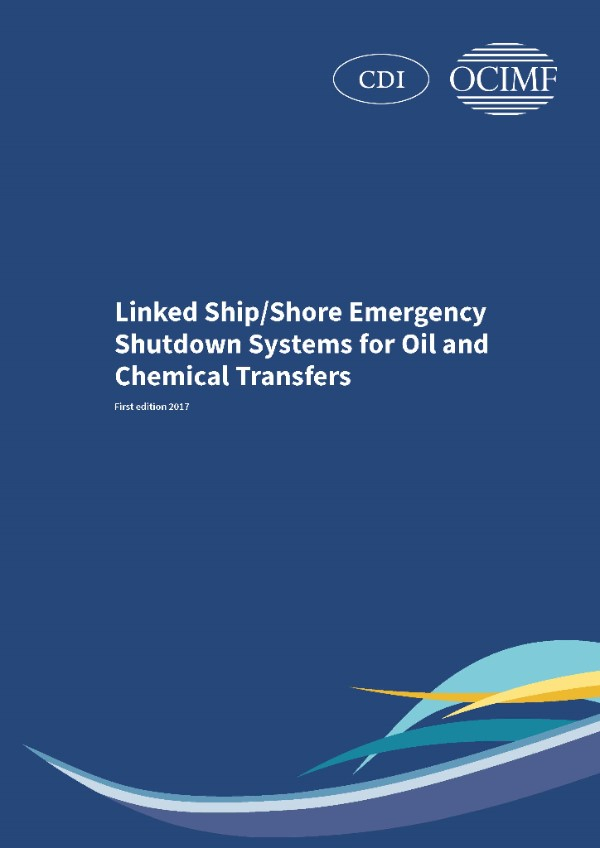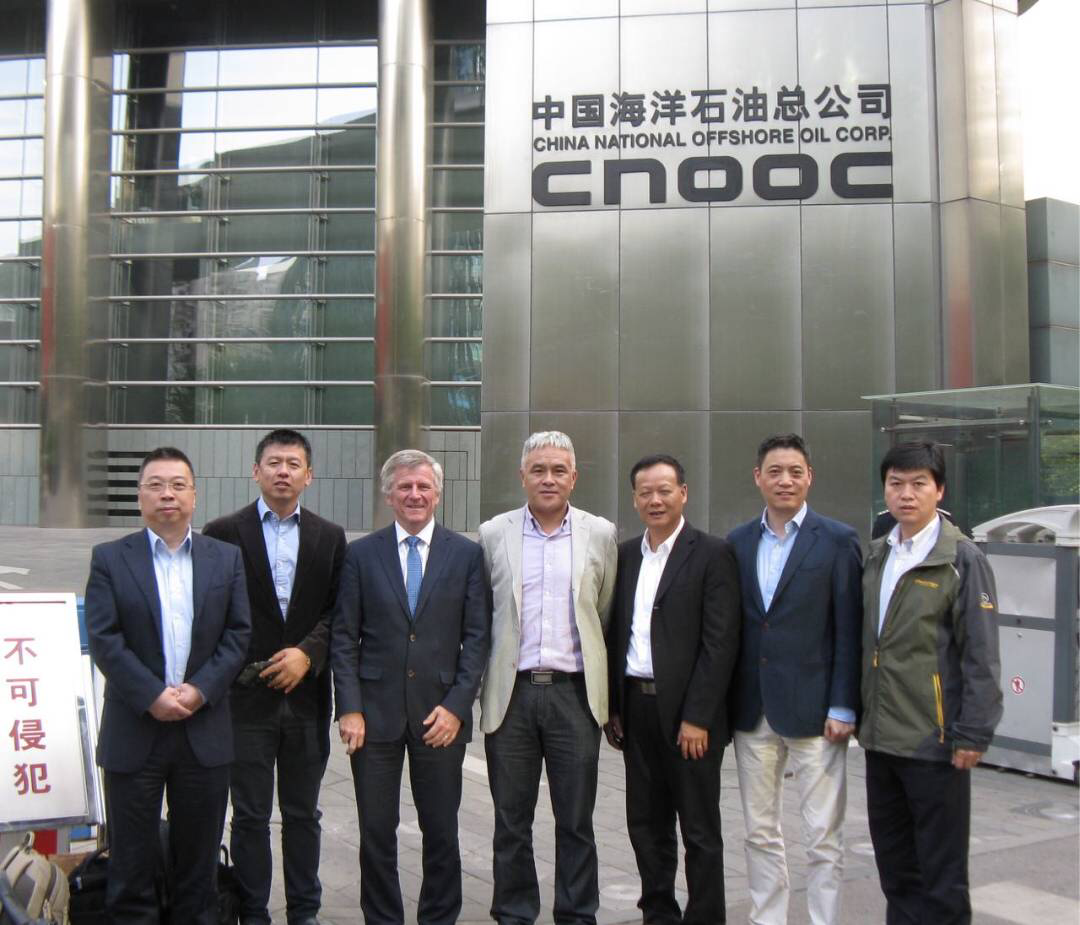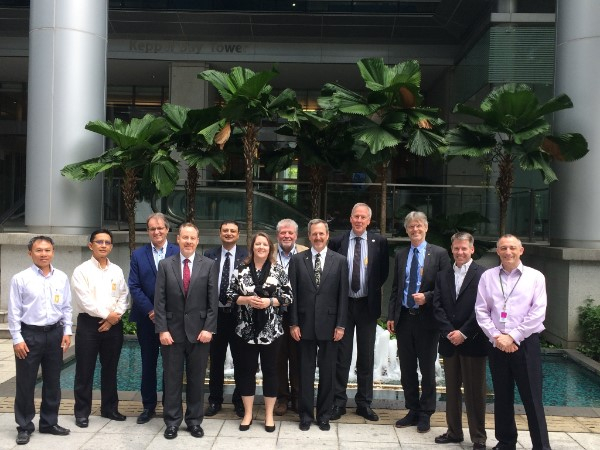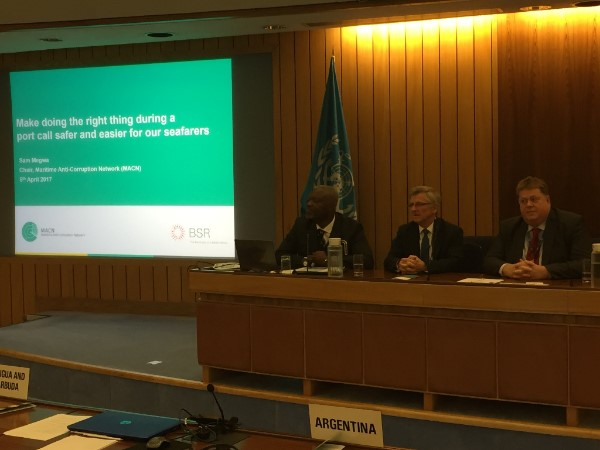"This third addition is the result of many months of collaboration within our membership"
Director's log

OCIMF released two significant publications which enhances the OCIMF library of publications which are available online (see links below).
Many of you will already be familiar with the Tanker Management Self Assessment - A Best Practice Guide. This third addition is the result of many months of collaboration within our membership which has distilled that wealth of knowledge into 266 key performance indicators (KPIs) and supporting best practice guidance that encourages continuous improvement in ship operations. We are grateful to INTERTANKO who supported the peer review process.
Linked ship/shore emergency shutdown systems have been a standard safety feature of LNG transfer operations for many years but notably absent in the oil and chemical tanker sector due to absence of a universally accepted connection. The joint OCIMF and CDI information paper, Linked Ship/Shore Emergency Shutdown Systems for Oil and Chemical Transfers, recommends a connection that should help terminals and vessels achieve that compatibility which will significantly improve the safety and environmental performance of tanker operations alongside terminals.
Looking forward we have included the draft agenda for the first of OCIMF’s regional marine forums, happening in Tampa in July, below. We look forward to seeing many of you there, or when the forum comes to your region.
Stay safe,

Andrew Cassels
Director OCIMF
Do you have news that you would like to share with our readers? If so email
New information paper

OCIMF and CDI released new information paper Linked Ship/Shore Emergency Shutdown Systems for Oil and Chemical Transfers on 21 April.
This paper recommends an Emergency Shutdown (ESD) connection that will link ship and terminal ESD systems, so that manual activation by the terminal or ship will stop cargo transfer operations. The information paper recommends an electrical umbilical incorporating 5-pin twist connectors for universal adoption. It can be used to provide the connection at both onshore and offshore terminals.

China Focus Group meeting
The China Focus Group met at the CNOOC Offices in Beijing, China on 20 April.
The meeting was well attended and topics discussed included, the revised OCIMF objectives and the achievements from 2016, terminal operator training in China, the ongoing translation of OCIMF publications into Mandarin and the possibility of a China specific barge inspection questionnaire within SIRE. The group's next meeting is planned to coincide with the COTSF conference later in the year.
Regional Marine Forums
OCIMF is pleased to give its members and invited guests a provisional agenda for the first Regional Marine Forum that will be held at the Hilton hotel in Tampa on 11 July.
This exciting new event will provide OCIMF members and invited guests an insight into the work being conducted within OCIMF along with Q&A sessions.
Draft Agenda
| Time | OCIMF Activity |
|---|---|
| 08:15 - 09:00 | Delegate Registration |
| 09:00 - 09:30 | Welcome Safety Moment Overview of Forum Objectives |
| 09:30 - 10:00 | What is OCIMF? |
| 10:00 - 11:30 | MEG 4 Update |
| 11:30 - 12:00 | Coffee Break (morning) |
| 12:00 - 13:00 | TMSA 3 Update |
| 13:00 - 14:00 | Networking Lunch |
| 14:00 - 15:00 | Other OCIMF Publications - Inert Gas Inf Paper - Personnel Transfer by Crane - Critical Spare Parts - Etc |
| 15:00 - 15:30 | Coffee Break (afternoon) |
| 15:30 - 16:00 | Pigeon Hole and Q&A |
| 16:00 - 16:30 | Meeting wrap-up |
| 16:30 - 19:00 | Evening Reception for all guests |
| 16:30 - 17:15 | OCIMF Members Only Discussion |
Register your interest for the upcoming OCIMF Regional Marine Forum
Any OCIMF members interested in attending should register here to receive updates.
Any non-members interested in attending should log their interest here. Only industry guests who perform work with tankers, terminals, or OSVs will be considered.
The OCIMF Secretariat and our North American Regional Marine Forum Champion, Jan Ziobro (Shell), look forward to seeing you at the event!
Please email

The Offshore Marine Commmittee. From left to right: Tran Van Tien (PetroVietnam); M Halim Saidi (Petronas); Hielke Brugts (Bluewater); Dave Sinclair (Maersk Oil); Zubin Bhada (Woodside); Laura Roth (ConocoPhillips); Dirk Martins (Total); Tim Coombs (Chevron); Bert Zwiers (Shell); Helge Vestre (Statoil); Andy Bush (Exxon); Tony Spence (BP).
Offshore Marine Committee
The 14th meeting of the Offshore Marine Committee (OMC) took place on 4-5 April at the BP offices in Singapore.
OMC discussed progress with ongoing work in each of its sub-committees (Floating Systems Group and OVID Focus Group) and working groups (Guidelines for Offshore Tanker Operations, Carriage of Methanol on Offshore Support Vessels and Cargo Securing onboard Offshore Support Vessels).
On the second day, OMC met with local offshore vessel/rig operators and Offshore Vessel Inspection Database (OVID) accredited inspectors to discuss OVID, the Offshore Vessel Management and Self Assessment (OVMSA) and common operational safety issues in the regional oil and gas offshore maritime industry.

News from the IMO
The Facilitation Committee (FAL) held its 41st meeting at the IMO headquarters from 4-7 April.
It was a well-attended committee meeting, the agenda was light and main business was completed in two days. The main points of interest to OCIMF members were electronic means of clearing ships, cyber security electronic certificates, stowaways and amendments to the FAL convention.
Cyber security
There was a short discussion on cyber threats. FAL 41 agreed to a produce a joint circular with the Marine Security Committee (MSC) on cyber risk management, subject to agreement by MSC 98. As there was no apparent need for FAL to consider the subject further, it was agreed that it should be removed from the FAL agenda.
Reporting of stowaways
Against a background of under-reporting of stowaway incidents and a recognised need to improve data, the Marshall Islands proposed adding data fields ‘Port / Terminal / Berth’ to the standard form for reporting the embarkation of stowaways.
Because of the procedural issues of amending an IMO convention without an approved work item output, it was agreed that an FAL circular will be issued while advice from the legal committee is sought.
Maritime Single Window
The feedback from the working group, which ran in parallel to the main meeting, was not conclusive. There is not yet consensus on whether IMO should be developing a new universal system, one based upon a member states existing system or just promulgating best practice. Concerns were raised that IMO is not developing as a global system but a template for some states to use if they haven’t developed their own.
Member States must complete this work and have systems available in 2019. While FAL recognise that it is unlikely that IMO will conclude it work by then. The committee also recognise that some states are relying on it and are committed to continuing the work.
OCIMF took the opportunity to introduce the Maritime Anti-Corruption Network (MACN) to IMO via a lunchtime presentation to over 30 Member States and NGO’s. Captain Sam Megwa, the Chair of MACN, gave a lively presentation which was well received.
SIRE programme updates
The SIRE programme will release the following updates to Barge Particulars Questionnaire (BPQ) templates for Europe and for South and Central America (SACA) on 3 July.
- Template 2025 – BPQ5 SACA Inland Dumb Barge.
- Template 2026 – BPQ5 SACA Inland Self-Propelled Barge.
- Template 2027 – BPQ5 SACA Inland Tug.
- Template 2028 – BPQ5 Europe.
SIRE participants have been notified and asked to circulate details to their IT departments. Any questions can be sent to
OCIMF server maintenance
SIRE, OVID and MTIS will be unavailable between 16:00 and 18:00 BST on 7 May while the OCIMF servers undergo essential routine maintenance.
Inspectors will be unable to submit SIRE and OVID Vessel Inspection Reports during this time. OCIMF WebServices will also be unavailable.
OCIMF Programme participants have been notified and asked to circulate details to their IT departments.
TMSA 3 is out now New in this third edition
Expanded best practice guidance to complement the KPIs. Revised best practice guidance to remove ambiguity and duplication.
Streamlining and merging of elements to improve consistency and make conducting the self assessment easier. Removal of the option to mark KPIs as not applicable.
- Introduction of updated industry legislative requirements, including the Manila Amendments to the Maritime Labour Convention 2006, the Polar Code and the Ballast Water Management Convention.
- Revised Element 6 and 6A - Cargo, Ballast, Tank Cleaning, Bunkering, Mooring and Anchoring Operations, with additional KPIs and best practice guidance.
- Revised Element 10 – Environmental and Energy Management (previously Environmental Management) incorporates the OCIMF Energy Efficiency and Fuel Management paper that was a supplement to the second edition of TMSA 2.
- New element: Element 13 – Maritime Security
For information including fast facts and FAQs see OCIMF resources
TMSA3 can be purchased at Witherby Seamanship
